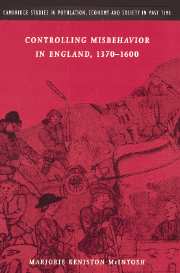Book contents
- Frontmatter
- Contents
- 1 List of illustrations
- 2 List of tables and lists
- Acknowledgements
- List of abbreviations
- Introduction
- Part I The history of social regulation
- 1 The forms of control
- 2 Methodological underpinnings
- 3 Social regulation in England's smaller communities
- 4 Social concern in other contexts
- Part II Factors that influenced social regulation
- Conclusion: social regulation and the transition from medieval to early modern England
- Appendices
- Bibliography
- Index
- Cambridge Studies in Population, Economy and Society in Past Time
3 - Social regulation in England's smaller communities
Published online by Cambridge University Press: 23 November 2009
- Frontmatter
- Contents
- 1 List of illustrations
- 2 List of tables and lists
- Acknowledgements
- List of abbreviations
- Introduction
- Part I The history of social regulation
- 1 The forms of control
- 2 Methodological underpinnings
- 3 Social regulation in England's smaller communities
- 4 Social concern in other contexts
- Part II Factors that influenced social regulation
- Conclusion: social regulation and the transition from medieval to early modern England
- Appendices
- Bibliography
- Index
- Cambridge Studies in Population, Economy and Society in Past Time
Summary
As part of their efforts to limit social disruption, leaders of England's lesser communities during the later medieval and early modern period decided in some cases to utilize the public courts held for their manor, borough, hundred, or composite estate. The reports they made to such courts as members of presentment juries together with the byelaws they passed allow us to investigate two central questions of this study: what was the history of social regulation over time, and what attitudes underlay local responses to wrongdoing, shaping the social construction of misbehavior? We can look also at issues of gender, examining the changing distribution of men and women among those reported for the various offences. Another theme is the discretionary powers of jurors, the remarkable independence with which they interpreted and extended formal law. Few of the forms of misconduct that worried them were proscribed by the common law, ecclesiastical law, Parliamentary statute, or royal injunction, and even when the offence was deemed illegal, responsibility for punishing malefactors was rarely assigned to the lesser public courts. Yet because such wrongdoing threatened local stability, jurors proceeded anyway. Equivalent autonomy is seen in their response to the playing of certain indoor and outdoor games banned by Parliamentary statute. In this case jurors were quite prepared to ignore illegal gaming in their communities unless it constituted a problem in their own eyes; when they did report and punish gamesters, they usually did so in a fashion different from that ordered in the statutes themselves. Material from the lesser courts thus provides forceful evidence of the agency of local jurors.
- Type
- Chapter
- Information
- Controlling Misbehavior in England, 1370–1600 , pp. 54 - 107Publisher: Cambridge University PressPrint publication year: 1998



